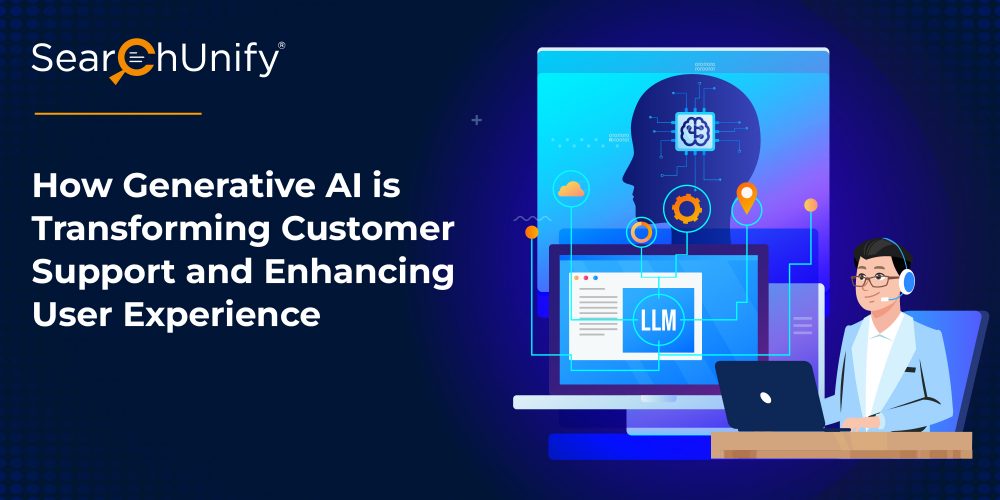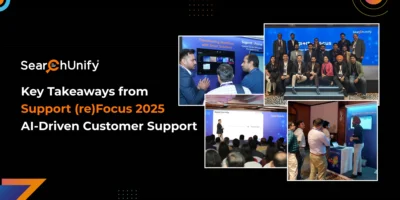
Did you know that nearly 100% of companies will use AI by 2025?
Enterprises deal with a massive amount of data. Every day, an unfathomable amount of information is generated, collected, and stored, fueling the digital landscape with unprecedented potential.
But as organizations strive to navigate this vast sea of data, they are increasingly seeking innovative strategies to unlock its hidden value, harness its insights, and transform it into tangible benefits. Enter the captivating realm of generative AI.
This transformative technology harnesses the remarkable capabilities of large language models (LLMs), notably exemplified by the groundbreaking GPT-3.5, to unlock the doors of imagination and generate fresh, unique content that mimics human creativity.
This blog post will delve into the fascinating realm of generative AI and explore its profound impact on customer support.
But First Things First—What is Generative AI?
Forrester defines “generative AI” as “A set of technologies and techniques that leverage massive corpora of data, including large language models, to generate new content (e.g., text, video, images, audio, code). Inputs may be natural language prompts or other non-code and non-traditional inputs.”
How Does Generative AI Work?
Generative AI leverages advanced machine learning techniques to generate new and unique content based on large datasets of existing data. The model learns the patterns in the data to create new content that is similar in style and structure. The more data the model is trained on, the more accurate and diverse the generated output will be.
There are two main types of generative AI: unconditional and conditional.
Unconditional generative AI creates new content without any specific inputs, while conditional generative AI creates new content based on specific inputs or constraints.
The growing adoption of generative AI is revolutionizing various industries, and the realm of customer support is no exception.
In fact, it is revolutionizing customer support by automating interactions, reducing response times, and improving the overall experience. It delivers personalized responses in real time, improves satisfaction, reduces costs, and provides valuable insights into customer behavior. Let’s unveil the mystery in the next section.
How Is Generative AI Transforming the World of Customer Support?
Here are a few of the ways that Generative AI is changing the customer support landscape:
1. Chatbots and Virtual Assistants
Generative AI-powered chatbots surpass traditional counterparts by comprehending diverse customer inquiries, including complex ones. They offer personalized responses, handle numerous inquiries concurrently, and learn from interactions for improved accuracy and efficiency. This automation alleviates human agents’ workload, quickens response times, and guarantees consistent customer service. Moreover, chatbots analyze interactions to uncover patterns, preferences, and pain points, empowering businesses to enhance their support strategies based on data-driven insights.
2. Personalized Responses
Generative AI can be employed to generate personalized responses to customer queries by considering the customer’s past interactions and preferences. This approach enhances customer satisfaction by delivering personalized responses that align with the customer’s requirements.
3. Intent Detection
Generative AI leverages extensive multilingual training data to understand and interpret the nuances and complexities of different languages more effectively. Furthermore, by harnessing the power of LLMs, it can achieve a significant boost in intent detection capabilities, enabling customer support teams to access precise answers and form a comprehensive understanding of the user’s journey thus far.
Generative AI can also analyze the conversation context, taking into account previous dialogue and the specific user query. This contextual awareness enables them to generate translations that are linguistically accurate and contextually appropriate, enhancing the overall user experience. This ensures that all customers receive support in their native language, regardless of where they are located.
4. Predictive Analytics
Generative A leverages large language models and sophisticated algorithms to learn and understand patterns in customer data. This allows customer support teams to uncover hidden patterns and trends that may not be easily identified by traditional tools, resulting in more accurate predictions. Generative AI can capture intricate details, identify subtle indicators of customer behavior, spot potential issues before they become significant problems, and empower customer support teams to proactively address customer needs.
5. Knowledge Creation
Generative AI can not only scan the existing content to generate a response that best matches the customer’s need, but it can also help with the challenge of creating accurate and relevant responses to frequently asked questions, product descriptions, or troubleshooting guides. For example, it can generate how-to videos or articles that help customers troubleshoot common issues. This type of content is especially useful for businesses that have a large customer base or deal with complex products or services.
The Road Ahead
Generative AI is revolutionizing the way businesses engage with their customers, providing valuable insights into customer behavior and preferences. But how can you implement it in your organizations?
There are two available options: hosting an open-source model in-house or using cloud-based API services. Make a choice based on your needs and desired control. In case, you are wondering how to navigate this decision-making process?
This webinar is here to guide you. Join Rowan Curran, Analyst, Forrester, and Alok Ramsisaria, CEO, Grazitti Interactive, in an enlightening session for making the right decision and guidance on leveraging Generative AI for improved business outcomes.











